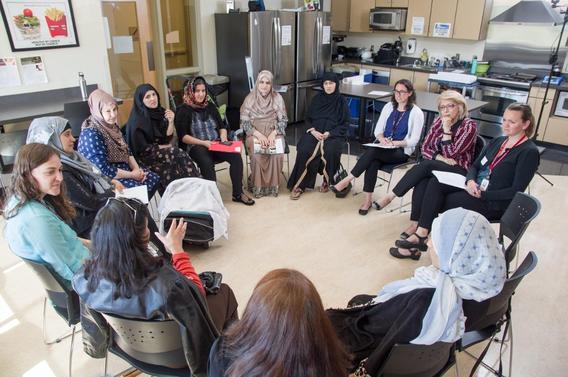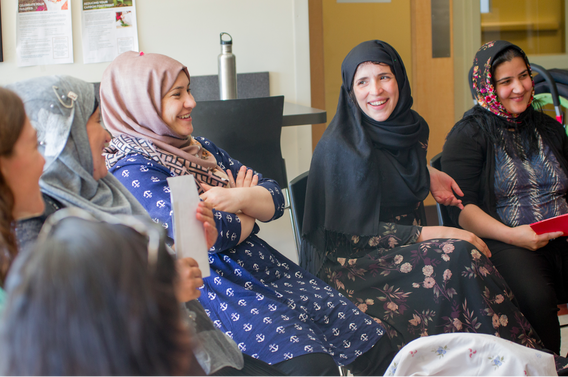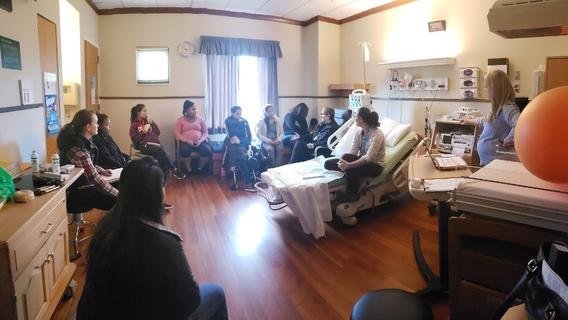More than 75,000 of the Afghans who were displaced as the Taliban took control of Kabul have found refuge in the United States through Operation Allies Welcome (OAW) Response. Established in 2021, OAW coordinated efforts among multiple federal, state, and local agencies to resettle and support Afghan newcomers. As the COVID-19 pandemic continued to unfold, Afghans arrived in the United States and resettlement agencies nationwide had to quickly work together with federal partners, healthcare systems, and public health departments, as well as social service and community-based organizations, to deliver much-needed support.
Recently resettled Afghans are adapting to their new lives, contributing meaningfully to their communities, accessing public benefits, and exploring opportunities for children and adults in their families. At the same time, they face hardships related to sudden displacement and navigating complex systems, like the U.S. healthcare system, as English language learners.
For resettled expecting mothers, navigating this unfamiliar health care system presents specific challenges. They may encounter linguistic and cultural barriers to information and services, which may affect the quality of care they receive and increase the risk of complications during pregnancy.
Preventive Care and Support for Expecting Afghan Mothers
Compared with expecting mothers in the United States who were not displaced, expecting mothers who recently resettled from Afghanistan may face a greater risk of developing complications during pregnancy because of factors like the following:
- Limited availability of appropriate healthcare, including prenatal care, during displacement and transit
- Insufficient food and/or clean water during displacement and transit
- Possible exposure to prevalent communicable diseases (e.g., tuberculosis) in their place of origin or places of transit
- Prevalence of non-communicable diseases (e.g., diabetes)
- Reduced use of healthcare services after resettlement due to lack of familiarity, lack of gender congruent providers, concerns about cost, fear, or distrust
- Barriers to accessing healthcare after resettlement, including language options for scheduling an appointment, health insurance requirements, and transportation to healthcare settings
- Misunderstandings about how and when to access emergency care services
- Differences in perspectives on hospital vs. home births
- Miscommunication between providers and patients due to language barriers, unavailability of interpreters, technological barriers, or other practical issues
- Miscommunication between providers and patients due to misunderstood cultural beliefs and practices around pregnancy and birth
- Loss of family support networks due to forced displacement
Preventive care and support—in the form of prenatal care, education, support groups, and other interventions—are vital to promoting healthy pregnancies and births for expecting Afghan mothers. Despite the risk factors above, most pregnant newcomers and their babies thrive. In order to ensure this, it is important for providers, nurses, birth educators, and other health workers to support the many strengths of pregnant women, devote special attention to improving access, develop bilateral trust, provide gender concordant care when feasible, honor their lived experience, community knowledge and expertise, and deliver linguistically and culturally concordant care.
Delivering holistic and comprehensive health services to Afghan women through patient-centered group prenatal care

HealthPoint, is a network of non-profit community-based health centers in Washington state that provide care to many communities, including newcomers from Afghanistan. One particular program that has led to positive health outcomes is the CenteringPregnancy model for prenatal care. This evidence-based model of group prenatal care, utilized across the country, has shown to decrease health disparities1; it consists of 10 facilitated two hour group prenatal visits with groups of 8-15 pregnant participants. Specifically, in an initiative first led by Dr. Shoshana Aleinikoff, Dr. Jessica Karp and Xiomara Pocasangre, CenteringPregnancy groups were held in the language Dari prior to the Operation Allies Welcome (OAW) response. As a result, not only did participants stay engaged in the program but children of participants also had higher rates of immunization and well-child checkups. Currently, this model is the default care model for pregnant people at HealthPoint.

The team implementing this model have adapted the curriculum to be more culturally appropriate for the participants and the majority of the cohorts are currently run in Dari. CenteringPregnancy honors the importance of this work and now offers health communications resources including a printed patient notebook and video in Dari. At HealthPoint, facilitators also encourage and empower pregnant participants to teach each other, which then organically ensures the conversations and curriculum are more culturally relevant. Although some participants have already given birth and can share their knowledge and experiences to others, not all pregnant people involved have delivered in the United States. Specifically, some individuals have had traumatic delivery experiences in hospitals in Afghanistan and have anxiety around what the experience may be like in the United States. As requested by group participants, these anxieties are now addressed during the prenatal program through either in-person or virtual tours of the hospital, in order to help alleviate concerns and answer questions.

This program not only provides health education, but also social connection for Afghan newcomers adjusting to life in the United States. By tying in medical care, this model also provides a cultural justification for Afghan women to leave and take private time away from the family. The CenteringPregnancy model for prenatal care, especially when tailored for Afghan refugees, can address critical health needs around health education, navigating new health systems, and community connection for recent arrivals.
Prenatal Care and Orientation for Afghan Newcomers in California
The Refugee Health Assessment Program (RHAP) at County of Santa Clara Health System provides healthcare services to refugees, asylees, humanitarian parolees, Special Immigrant Visa (SIV) holders, and victims of human trafficking. An important part of the RHAP’s OAW response has been screening Afghan newcomers and connecting them to appropriate obstetric and pediatric care.
Mylene Madrid, RHAP Coordinator, notes, “One of the big changes that I’ve noticed is that many clients have had many children already. They’ve given birth to many children, and those were home births or never in a hospital.” Since visiting a hospital during the COVID-19 pandemic was intimidating and logistically challenging for these clients, the RHAP shared a video tour of the labor and delivery unit at Santa Clara Valley Medical Center with Dari- and Pashto-speaking case managers, who then showed it to clients to help them gain familiarity with the unit and understand more about what to expect in a hospital birth. The case manager’s intervention was part of a coordinated effort that also included teaching by clinic nurses and providers.
RAHP staff, nurses, providers, and expecting Afghan mothers have all needed to adjust their expectations around care and communication during pregnancy and birth. Mylene Madrid explains, “[Hospital birth] just wasn’t part of the standard practice back home. You relied on people who could help you do home births. So when we say, ‘You’re 38 weeks pregnant, you should come to the hospital and get checked out, because you have not had prenatal care here,’ they’re like, ‘Hmmm, it’s my eighth child, I think I’ve got this’… They’re not opposed to going, but the feeling of urgency is different.” The RHAP has responded to these challenges by maintaining consistent messaging while demonstrating patience, respect, and cultural sensitivity in their communication with expecting Afghan mothers and their families.
Comprehensive Maternal Support from Pregnancy to Postpartum Period in Pittsburgh, Pennsylvania
“Smart Start” is a program that provides culturally tailored perinatal and postpartum support for immigrants and refugees. This program was developed at Hello Neighbor, a nonprofit organization based in Pittsburgh, Pennsylvania, that resettles refugees and supports refugees and immigrants in the Pittsburgh community. The program evolved by recognizing the need for specialized support from both refugee resettlement practitioners and birth workers. On January 3rd, 2022, Hello Neighbor began resettling Afghan refugees. By February 15th, Hello Neighbor had resettled 217 individuals; of those, 20 of our new neighbors were pregnant, and 6 pregnant clients were due within 6 weeks after they arrived. In addition to the pregnant clients, Hello Neighbor received referrals for clients of the other 3 resettlement agencies - an explosion of need resulting in 54 pregnancies receiving support between January 2022 - June 2022. During this time, Smart Start pivoted services to meet clients' needs. Abby Jo Perez, now the Refugee Health and Stabilization Supervisor, trained to become a birth doula and a car seat tech, in addition to her decade of experience working in refugee resettlement. Due to this sudden increase in need, there was a lot of effort to meet this need in a culturally informed manner-providing education to the community, including hospital departments, WIC, and parental support programs on language access, resettlement experiences, and Afghan cultural needs. To provide and advocate for culturally and linguistically appropriate care, the Smart Start Coordinator (Abby Jo) advocated for Pashto and Dari interpreters (especially female interpreters) to stay on the phone during labor even without the medical provider in the room so that they could have interpretation throughout labor with their other labor support team (i.e. doula, nursing staff, social work). They also learned to cook Afghan postpartum meals for patients after birth, hired additional program staff, and developed additional programming addressing more comprehensive needs. Ultimately, by understanding both the nuances of the refugee resettlement journey and the skills needed to support a person through the birthing process in the United States, Smart Start staff can provide nuanced and more comprehensive support to pregnant immigrants and refugees–as well as support community partners in meeting the clients’ cultural and linguistic needs.
“What we do is we take a refugee resettlement case manager lens to birth work. For example, many of my clients haven’t had exposure to what an epidural is, so the medical system anesthesiologists typically want to move really fast, but even with good interpretation explaining the positioning for an epidural can be foreign; it’s just a wildly new concept. So sometimes we will – I have – even jumped on the bed and said, ‘this is hard. You’re in contractions.’ The interpreter is on the phone. It’s not an easy situation. ‘This is physically what you do.’ And then I demonstrate with my body next to our client - it can bridge the communication barrier that exists when using a phone interpreter and in being in a lot of pain.” - Abby Jo Perez
Because most patients receive care at the University of Pittsburgh Medical Center Magee-Women’s Hospital, the Smart Start program works with hospital staff to support patients navigating prenatal care, labor and delivery, and postpartum care. Christina Weiss, Director of Operations of University Obstetrics and Gynecology, shared that the hospital responds to patient needs through various strategies, including providing language services through dedicated iPads or interpreters provided to patients as they navigate their medical visits from registration throughout the entirety of the visit. With the influx of patients speaking Dari and Pashto after the start of OAW, patients are provided with interpretation support in-person and/or utilizing iPads upon arrival at check-in; patient documents, including registration forms and questionnaires, are also translated into Dari and Pashto. At the hospital, patient room doors have labels indicating (1) the language of health care for the patient and (2) if female-only providers were requested. These labels allow the care team to be more linguistically and culturally aligned with the patient and family throughout the hospital's inpatient and outpatient settings. The preference for female providers is also indicated in the EHR through documentation in the patient chart. As part of the larger “Social Factors Care Plan” implemented at Magee-Women’s Hospital, birthing patients are also offered free doula services, support around childcare and transportation needs, especially for scheduled inductions or C-sections, a tour of the hospital, and services addressing other social determinants of health (i.e. financial support, insurance support, immigration status support, food security support, and dietary needs).
“Every patient should have the same level of care regardless of the barriers they are facing, whether it be language, or any social determinant of health.” - Christina Weiss, BSN, LCCE, CBC, Director of Operations University Obstetrics and Gynecology
This collaboration between Hello Neighbor and UPMC Magee-Women’s Hospital exemplifies how expanding the scope of providing care for pregnant Afghan refugees and cross-sector communication can give rise to innovative programs and strategies that improve refugee health care and resettlement services.
